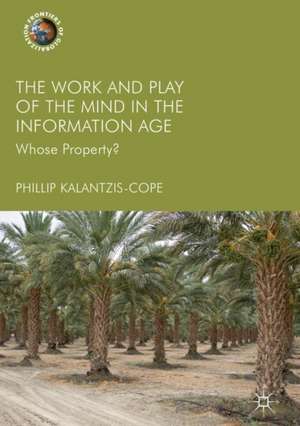The Work and Play of the Mind in the Information Age: Whose Property?: Frontiers of Globalization
Autor Phillip Kalantzis-Copeen Limba Engleză Hardback – 3 oct 2017
In its theoretical analysis, the book illuminates four alternative political agendas for the work and play of the mind. These four “propertyscapes” represent competing visions for social life, framing projects for collective political action that are at times competing, at times overlapping. The author prompts us to consider whose property is the work and play of the mind, as well as addressing larger questions regarding the framing of political space, the kinds of political communities we may need for the future, and the changing place of the work and play of the mind within these social imaginaries. The book will be of interest to students and scholars across a range of disciplines including media and communications, arts and design, law, politics and interdisciplinary social sciences.
Din seria Frontiers of Globalization
-
 Preț: 384.86 lei
Preț: 384.86 lei -
 Preț: 391.61 lei
Preț: 391.61 lei -
 Preț: 393.52 lei
Preț: 393.52 lei - 15%
 Preț: 639.59 lei
Preț: 639.59 lei -
 Preț: 388.72 lei
Preț: 388.72 lei -
 Preț: 389.88 lei
Preț: 389.88 lei - 15%
 Preț: 585.26 lei
Preț: 585.26 lei - 18%
 Preț: 883.59 lei
Preț: 883.59 lei - 8%
 Preț: 493.64 lei
Preț: 493.64 lei - 15%
 Preț: 700.94 lei
Preț: 700.94 lei - 18%
 Preț: 944.99 lei
Preț: 944.99 lei - 18%
 Preț: 896.84 lei
Preț: 896.84 lei -
 Preț: 385.84 lei
Preț: 385.84 lei -
 Preț: 392.60 lei
Preț: 392.60 lei -
 Preț: 387.38 lei
Preț: 387.38 lei - 15%
 Preț: 643.34 lei
Preț: 643.34 lei
Preț: 439.91 lei
Preț vechi: 498.94 lei
-12% Nou
Puncte Express: 660
Preț estimativ în valută:
84.19€ • 87.78$ • 69.97£
84.19€ • 87.78$ • 69.97£
Carte indisponibilă temporar
Doresc să fiu notificat când acest titlu va fi disponibil:
Se trimite...
Preluare comenzi: 021 569.72.76
Specificații
ISBN-13: 9783319646497
ISBN-10: 3319646494
Pagini: 226
Ilustrații: IX, 226 p.
Dimensiuni: 148 x 210 x 21 mm
Greutate: 0.44 kg
Ediția:1st ed. 2018
Editura: Springer International Publishing
Colecția Palgrave Macmillan
Seria Frontiers of Globalization
Locul publicării:Cham, Switzerland
ISBN-10: 3319646494
Pagini: 226
Ilustrații: IX, 226 p.
Dimensiuni: 148 x 210 x 21 mm
Greutate: 0.44 kg
Ediția:1st ed. 2018
Editura: Springer International Publishing
Colecția Palgrave Macmillan
Seria Frontiers of Globalization
Locul publicării:Cham, Switzerland
Cuprins
1. Introduction: Becoming Property.- 2. The Private: Whose Equilibrium?.- 3. The Exceptional: Whose Creativity?.- 4. The Transformative: Whose Network?.- 5. The Ecological: Whose Nature?.- 6. Conclusion: Whose Property?.
Notă biografică
Phillip Kalantzis-Cope holds a Ph.D from the Department of Political Science at the New School for Social Research, New York, USA
Textul de pe ultima copertă
This book tells a series of living stories about a domain of social activity, “the work and play of the mind,” in a particular historical epoch: the “information age.” The stories concern political processes and movements as varied as the World Trade Organization’s Trade-Related Aspects of Intellectual Property Rights, China’s Great Firewall, practices of image sharing in social media, Occupy Wall Street, The Arab Spring, The Alt-Right, and the use of geographical indications by indigenous peoples and farmers to defend their lifestyles.
In its theoretical analysis, the book illuminates four alternative political agendas for the work and play of the mind. These four “propertyscapes” represent competing visions for social life, framing projects for collective political action that are at times competing, at times overlapping. The author prompts us to consider whose property is the work and play of the mind, as well as addressing larger questions regarding the framing of political space, the kinds of political communities we may need for the future, and the changing place of the work and play of the mind within these social imaginaries.
The book will be of interest to students and scholars across a range of disciplines including media and communications, arts and design, law, politics and interdisciplinary social sciences.
In its theoretical analysis, the book illuminates four alternative political agendas for the work and play of the mind. These four “propertyscapes” represent competing visions for social life, framing projects for collective political action that are at times competing, at times overlapping. The author prompts us to consider whose property is the work and play of the mind, as well as addressing larger questions regarding the framing of political space, the kinds of political communities we may need for the future, and the changing place of the work and play of the mind within these social imaginaries.
The book will be of interest to students and scholars across a range of disciplines including media and communications, arts and design, law, politics and interdisciplinary social sciences.
Caracteristici
Includes a foreword by McKenzie Wark, author of A Hacker Manifesto Tells the story of the information age as reflected in its forms of property Analyses the dilemmas of free property, and the expropriation of that property by new media corporations
